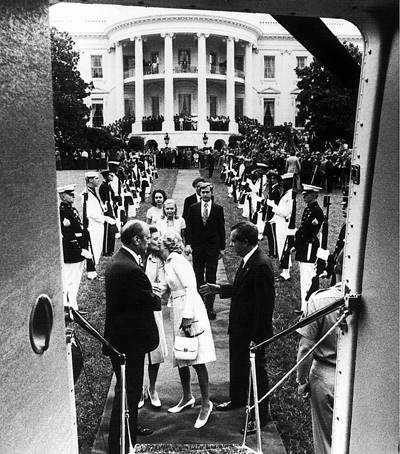HEGGEN: Freedom of press: essential to democracy

Then-President Richard M. Nixon leaving the White House on August 9, 1974 shortly before his resignation became effective. Without freedom of the press, government scandals such as Watergate could never have been publicly reported upon. Photo courtesy: Wikimedia Commons
April 15, 2009
What if you couldn’t read this?
Certainly this is not the most controversial column to ever run in this newspaper. But what if someone did not allow its publication or didn’t allow the editors to choose what ran and what didn’t in this paper? That is, what if someone other than the editors — someone in the government, for example — controlled what kind of message was being sent out to this paper’s readers?
And can you imagine what it would be like without a free press? All the stories that might have gone unreported, the violations that could have gone on, unknown to the public.
If there had been no free press, historians would have portrayed President Richard M. Nixon in a very different light.
The Watergate scandal that eventually took down Nixon was a nearly impossible story to cover and took months — years — of gumshoe reporting and digging by Bob Woodward and Carl Bernstein.
At times, people doubted them and most newspapers weren’t covering the stories. Public opinion still sided with the president. The Washington Post reporters were repeatedly pressured not to pursue the story. But they did.
And the fallout included the resignation of the president of the United States, 35 years ago this August.
Nixon, whose administration and campaign was using an array of dirty tricks and intimidation tactics against his opponents, would have stayed in office and finished his term. I don’t know what the country would have looked like if Nixon had not resigned, but justice would not have been served.
Although Watergate is the most familiar example of how the press has kept the government in check, let’s look at a recent and local example.
Even covering something like crime and courts can be greatly affected.
The Atiba Spellman trial, which was covered quite well by both the Ames Tribune and the Iowa State Daily, recently found Spellman guilty on two counts of first-degree murder. It was an awful story, one where Spellman was convicted of taking the life of his ex-girlfriend and another man.
By covering this story, the community learned about these people and learned more about an all too common thing in this country: domestic abuse.
That’s what a free press does: it reports information so citizens can have conversations about important issues. The press provides an open forum for discussing and understanding the issues and ideas a society values.
But a story like this may have not of seen the light of day if there wasn’t a free press. A government could decide it didn’t want to release the details of a homicide in order to save face, and none of this information would have been available for the people.
The point is, in order for a democracy to work and a people to govern themselves, they must be educated enough on what is happening in their world to be able to make decisions.
In order for this to happen, people need to know what its powerful institutions are doing, what decisions they are making and what those decisions lead to. And this is why we have a free press, because without a free press there is no democracy. Or, as former CBS “Evening News” anchor Walter Cronkite said: “Freedom of the press is not just important to democracy — it is democracy.”
So let’s not take it for granted and celebrate our First Amendment rights.






